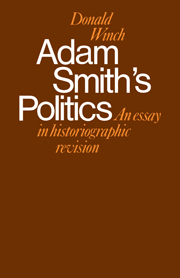Book contents
- Frontmatter
- Contents
- Acknowledgements
- Abbreviations
- 1 Introduction: the problem – the liberal capitalist perspective
- 2 Republicanism and sceptical Whiggism
- 3 Hutcheson and Smith: Real Whig versus sceptical Whig
- 4 Commerce, liberty and justice
- 5 Martial spirit and mental mutilation
- 6 A ruinous expedient
- 7 The present disturbances
- 8 Conclusion
- Bibliography
- Index
- Title in the series
4 - Commerce, liberty and justice
Published online by Cambridge University Press: 03 February 2010
- Frontmatter
- Contents
- Acknowledgements
- Abbreviations
- 1 Introduction: the problem – the liberal capitalist perspective
- 2 Republicanism and sceptical Whiggism
- 3 Hutcheson and Smith: Real Whig versus sceptical Whig
- 4 Commerce, liberty and justice
- 5 Martial spirit and mental mutilation
- 6 A ruinous expedient
- 7 The present disturbances
- 8 Conclusion
- Bibliography
- Index
- Title in the series
Summary
The Wealth of Nations can be accurately, if not very fully, described as an extended treatise on the reciprocal relationship between commerce and liberty. Unfortunately, the success story which revolves around Smith as the founding father or evil genius of ‘economic liberalism’ has concentrated attention on one side of this relationship – the examination of the benefits of a regime of economic liberty for the growth and diffusion of commercial prosperity. Smith's interest in the other side of the relationship – the effect of the emergence of commercial society in producing a regime of liberty and justice – has suffered by contrast. ‘Economic liberal’ is essentially a nineteenth-century label, though one which most commentators have been happy to retain. It focusses attention on the role of the state in the economic affairs of individuals, but does not give due recognition to the historical framework of Smith's inquiry into the interrelationship of commerce and liberty. Nor does it adequately characterise the larger social and political dimensions of that inquiry. On both counts, therefore, it leads to neglect of one of Smith's main claims to have advanced the understanding of his contemporaries.
Smith was not, of course, alone in dealing with the commerce and liberty theme. Its early delineation by his predecessors, Montesquieu and Hume, forms one of the bases for their claim to speak decisively for the ‘moderns’ against the ‘ancients’ on this matter. The theme also appears as a leitmotiv in the writings of other Scottish historians of civil society, notably those of Lord Kames, Adam Ferguson, William Robertson, and John Millar.
- Type
- Chapter
- Information
- Adam Smith's PoliticsAn Essay in Historiographic Revision, pp. 70 - 102Publisher: Cambridge University PressPrint publication year: 1978
- 1
- Cited by

